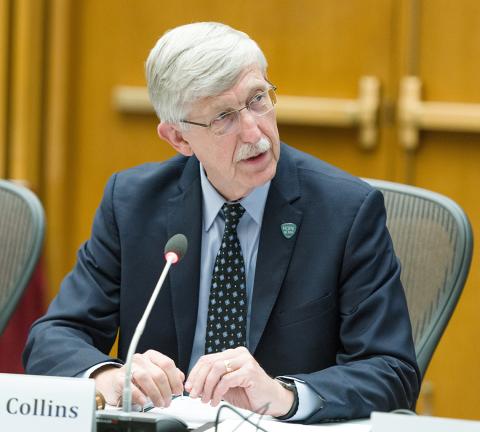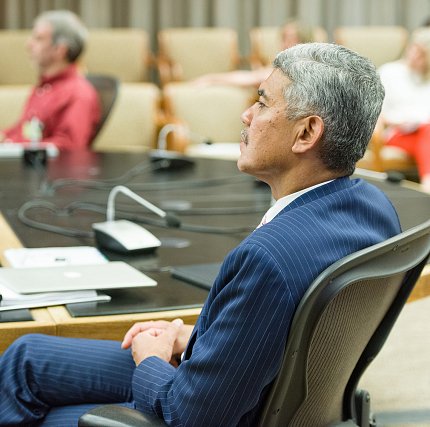Range of Issues Considered at 116th ACD Meeting

Photo: Andrew Propp
Although NIH director Dr. Francis Collins instantly accepted the unanimous recommendation of the 116th gathering of the advisory committee to the NIH director that NIH begin at once to terminate NIAAA’s 10-year, $88 million Moderate Alcohol and Cardiovascular Health (MACH) study due to numerous departures from established norms governing public-private partnerships, much else occupied the ACD during its semi-annual deliberations June 14-15.
“It’s been a pretty intense 6 months since we last met,” said Collins at the outset of a meeting that traditionally displays the breadth and depth of agency concerns.
In just a day and a half, the group reviewed at least a dozen major issues, including:
- The 15 themes that make up the $500 million HEAL (Helping to End Addiction Long-term) Initiative that NIH has embarked upon to address the nation’s epidemic of opioid misuse and abuse. “This crisis is not going to be solved by any single intervention,” said Collins, noting that opioids were responsible for more than 42,000 deaths in 2016 (some 20 percent of which may have been suicides, added NIDA director Dr. Nora Volkow).
- Personnel actions, including nationwide searches for new directors of NIBIB, NIDCR and NCCIH, plus a new chief data strategist—preferably one with Silicon Valley expertise, Collins noted—to help make sense of the information tsunami generated by the more than 25 million people participating in cohort studies worldwide.
- A précis of NIH’s response to the most recent outbreak of Ebola in Africa, offered by NIAID director Dr. Anthony Fauci, who lauded NIH’s “ability to hit the ground running when called upon in an emergency situation.” Ironically, the current, limited outbreak—one of 24 that have occurred since 1976—is affecting the Democratic Republic of the Congo, formerly known as Zaire, host of the world’s first recognized outbreak. The current outbreak is the country’s ninth.
- Optimism about NIH budgets that, in the past 3 years, have risen a total of $7 billion, which has put a major dent in the 22 percent loss in inflation-adjusted dollars that NIH experienced between 2003 and 2015. NIH is now only 11 percent behind its FY 03 purchasing power, and on June 14, the House proposed a $1.25 billion increase for NIH in FY 2019.
- The Next Gen Researchers Initiative is fine-tuning its focus on early-stage investigators, with a goal of increasing their number from 1,040 to 1,100 in the coming fiscal year, with help flagging at-risk scientists to take place in the meantime. “We’re not waiting until December [when the Next Gen working group issues its final report],” Collins noted.
- A new NIH anti-harassment policy governing both intramural and extramural behavior that will debut this summer. “I am embarrassed by the fact that our advisory committee to the director is so unbalanced with respect to gender,” said Collins at the start of the discussion, adding that he will make it his highest priority to correct the situation. Dr. Lawrence Tabak, NIH principal deputy director, serves as chair of the NIH anti-harassment steering committee and outlined features of the new policy.
- Also shy in attracting women have been some of NIH’s high-risk, high-reward grant programs; discussants wondered if some of the language in FOAs—funding opportunity announcements—has been off-putting to potential female candidates.
- The BRAIN Initiative, begun in 2013, is now maturing to BRAIN 2.0, to be presented in final form next June. The funding has been ramping up. Thus, at the halfway point of its 10-year tenure, only 11 percent of its funds have been obligated, said NIMH director Dr. Josh Gordon. BRAIN is only about 10 percent of NIH’s overall neuroscience spending, said Collins. NINDS director Dr. Walter Koroshetz expects recent scientific advances “to put electrodes out of business” as precision circuit modulation of specific cell types becomes possible.
- Upwards of 25 million Americans suffer chronic pain daily, Koroshetz reported, adding, “It’s pretty clear we have inadequate treatment…We have terrible treatments for people with chronic pain.” Opioids will need to be displaced from the pharmacopeia, he said. “[Understanding] the basic science of pain has exploded in the last few years,” Koroshetz noted. “There are valuable assets out there that need testing.”
- A dearth of women and underrepresented minorities in the scientific workforce is still a burning issue, said Dr. Hannah Valantine, NIH chief officer for scientific workforce diversity; academia is not “pulling” well-trained members of this population into the ranks of tenured professorship. “Changing the culture to be more hospitable requires real commitment,” she told the group.

Photo: Andrew Propp
And then there was the MACH study—designed as a multicenter, randomized clinical trial to determine the effects of one serving of alcohol (approximately 15 grams) daily, compared to no alcohol intake, on the rate of new cases of cardiovascular disease and the rate of new cases of diabetes among participants free of diabetes at baseline. The study came into question via news reports published last March.
Initially funded in September 2016 [some $68 million from the beverage industry, via the Foundation for the National Institutes of Health, with NIAAA committing $20 million over 10 years—only $16 million had been spent, in total, so far] MACH was suspended by NIH on May 10 for ethical lapses. Scrutinized by both NIH’s Office of Management Assessment and an ACD working group, the study, which had already recruited 105 subjects, starting last February, was found to have crossed multiple ethical lines, Collins said. “It’s doubtful that study results could ever have been credible.”
“I must say I’m disappointed with what transpired,” said NIAAA director Dr. George Koob. He acknowledged “design issues and significant process irregularities that undermined the integrity of the research…The study is irrevocably damaged and we cannot justify continuing.”
“Purely on scientific grounds, I never really quite understood why this trial was being done,” said ACD member Dr. M. Roy Wilson, president of Wayne State University, especially with the opioid issue going on. “There are many of us, including me, who will take a drink or two of wine a day. We don’t do it for health reasons. The results of the trial just wouldn’t have influenced me one way or the other.”
Collins emphasized that “most public-private partnerships are greatly beneficial and above reproach,” mentioning efforts in Alzheimer’s disease, diabetes, lupus, cancer and Parkinson’s disease, among others. “We want to avoid putting tar on our brush and spreading it around indiscriminately.”

Photo: Andrew Propp
He said MACH provided a “teachable moment” and acknowledged that “clearer boundaries are needed…We need to understand what appropriate behavior is. But we don’t want an investigative culture, either.”
Collins called for 60 days of information-gathering on all NIH studies involving non-federal funding. “This was an unusual outlier,” he said, “but we need to be sure…We need to reinforce standards of ethical behavior across NIH.”
The issue will be revisited at the next ACD meeting in December, Collins said. “We will report on what we’ve found and what actions we will take…This is a matter of the greatest seriousness. We will not just be checking a box and saying ‘We took care of that.’ We need to live up to the principles of openness and fairness which are a mainstay of our integrity. Anything that compromises that is unacceptable.”
At a media session on MACH following the conclusion of the ACD meeting, Tabak noted that “a small number of employees violated NIH policies” and that “appropriate personnel actions will result.
“This isn’t an indictment of industry engagement,” he said. “It’s an indictment of the way this one was conducted.”
